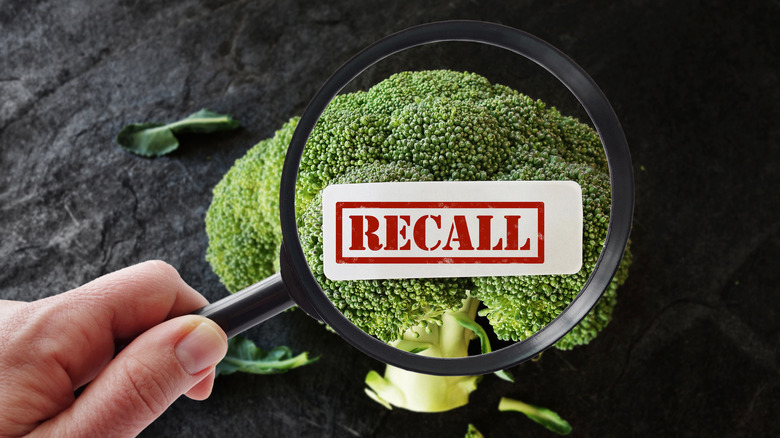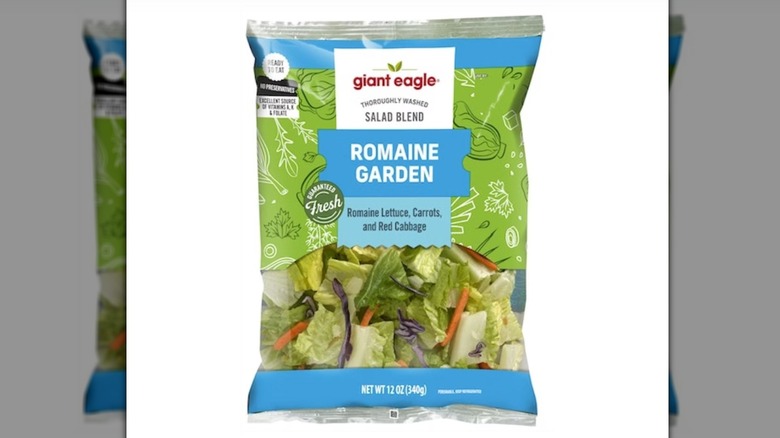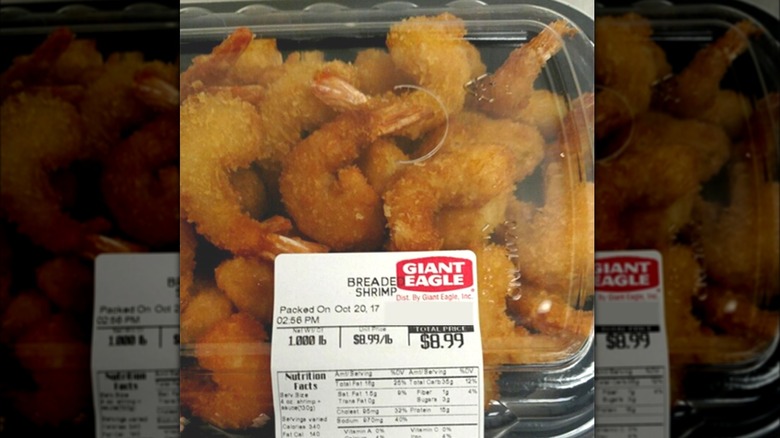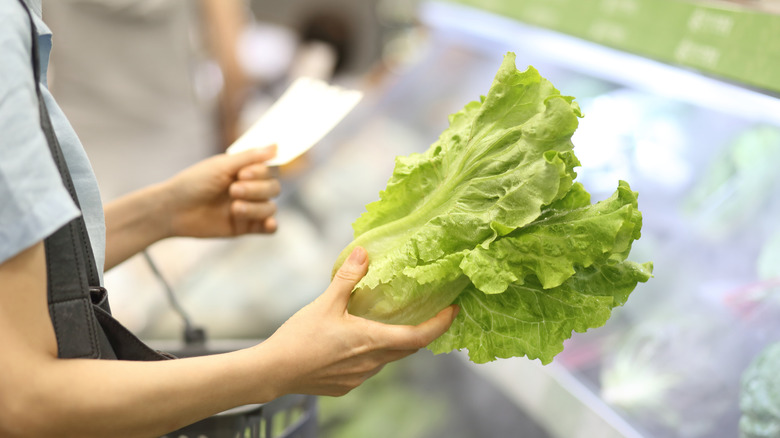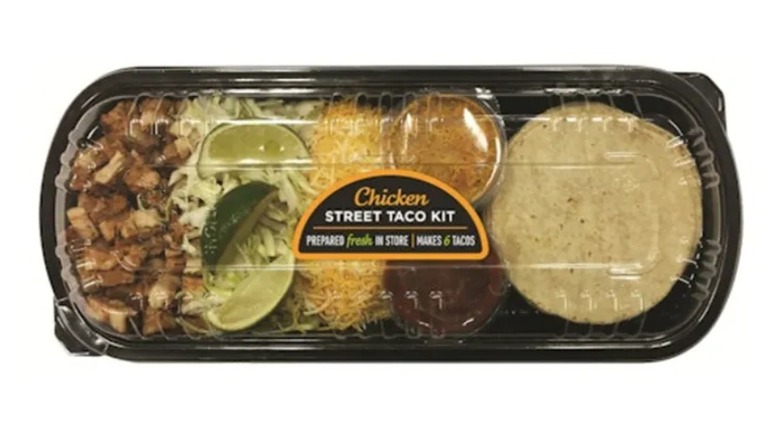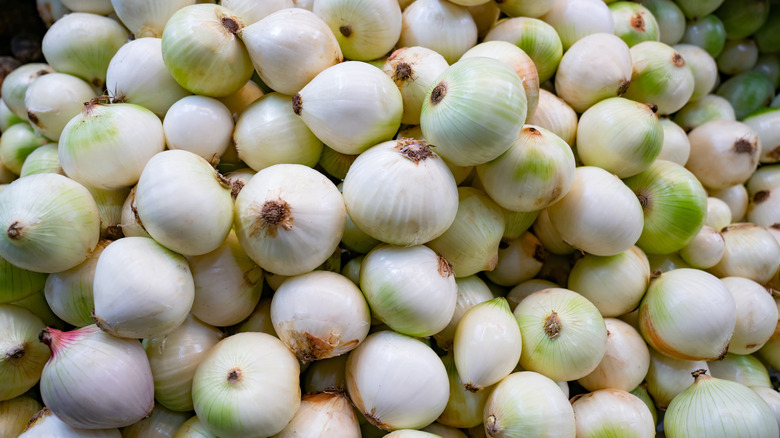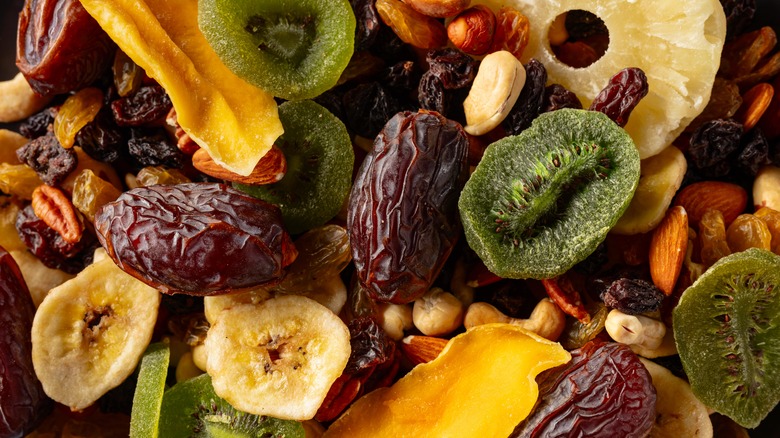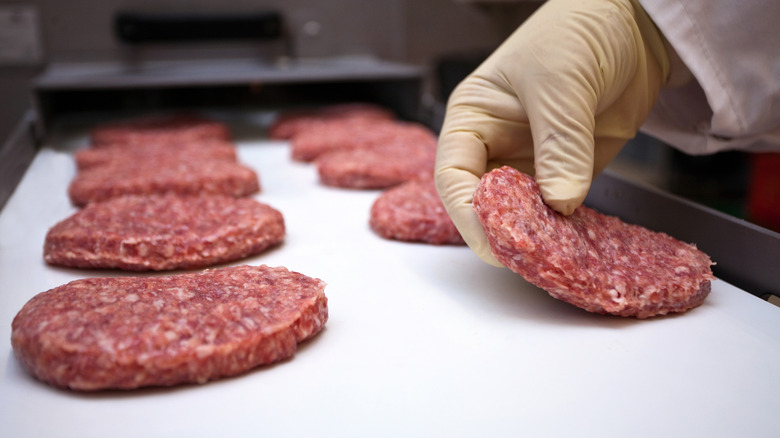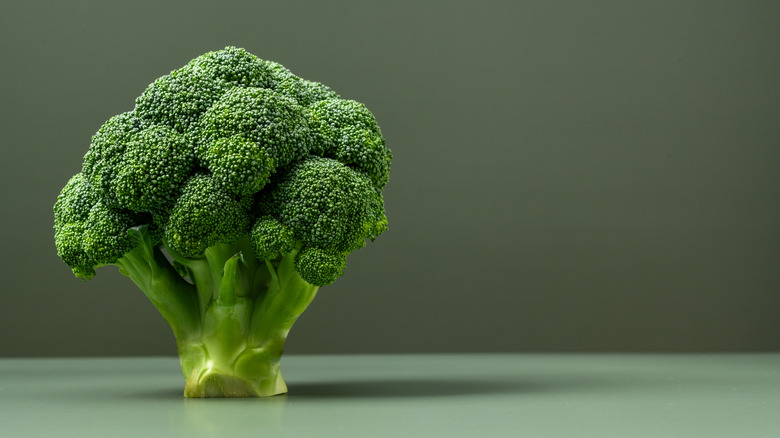14 Food Recalls That Will Always Haunt Giant Eagle
It's fair to say that as brands go, Giant Eagle hasn't always been the most reliable. The supermarket chain has been around for over 90 years, and has grown a family company into a booming business that boasts more than 130 stores nationwide. However, while it may have one of the best grocery store bakeries out there, over the decades it's been plagued by poor customer satisfaction scores, and more than its fair share of recalls. In the last few years alone, Giant Eagle has had to put out multiple recalls for various products due to their potential of contamination — and that hasn't done much to restore trust in the brand.
Recalls are not unique to Giant Eagle, of course; supermarkets announce them all the time, with contaminants or allergens potentially sneaking into products at any point in their production. However, at Giant Eagle they seem to happen more often than you might think. Additionally, these food recalls can be incredibly serious. If they're not caught, they can result in illness, and can even have fatal consequences It's important to be aware of the kinds of products that stores like Giant Eagle have had to recall in the past, so that you can be prepared for the future.
1. In 2021, salad products were recalled due to Listeria concerns
Salad items are some of the most common to be recalled, a fact that Giant Eagle had to reckon with back in 2021. Towards the end of that year, the supermarket put out a recall notice for over 50 individual salad products sold in its stores. These products, which were shipped across the country and sold between the dates of December 12 and 20, were part of Giant Eagle's flagship brand, as well as the Fresh Express and Market District lines.
The reason for the recall? Listeria. The company caught wind of the fact that its Streamwood, Illinois, facility may have been compromised by Listeria infection, which may then have gotten into its salad products. It was right to recall them, too. Listeria infection can lead to incredibly serious symptoms and consequences, and is particularly dangerous for pregnant people and unborn and just-born babies. Luckily, it appears that Giant Eagle managed to catch things in time. No illnesses were reported following the recall or by people who had bought any of the listed products, but it was a close call for the supermarket.
2. Breaded shrimp was recalled after an undeclared egg allergen
Fried shrimp is one of those foods that everyone loves, and on its own its an especially uncontroversial dish. However, that lack of controversy was seriously tested a few years back, when Giant Eagle had to put out a warning to customers who had bought its Breaded Shrimp product. It appears that Giant Eagle's labeling system was at fault here. While the ingredients listed egg, the allergen information did not, meaning that customers who were quickly glancing at the allergen info were unlikely to see that it could be triggering.
While egg allergies are fairly rare and tend to be outgrown by children, they can be very severe. Like other allergies, egg allergies can cause symptoms from diarrhea to anaphylaxis, and in the worst-case scenarios can be life-threatening. This risk wasn't helped by the fact that Giant Eagle had already sold around 600 packages of its Breaded Shrimp before the recall was announced. Thankfully, this 2017 recall didn't seem to have any major consequences. No illnesses were reported in relation to the product, and while it remains unclear exactly whether anyone had an allergic response, Giant Eagle management likely breathed a big sigh of relief.
3. 2024's lettuce recall was due to E. coli
While food standards are always improving, 2024 has seen yet more food recalls for major retailers — and Giant Eagle was no exception. The supermarket chain put out a wide scale recall of lettuce sold at the end of 2023 due to potential contamination from E. coli. The lettuce, both red and green varieties produced by Adam Bros. Farming, was sold between December 3 and 14, and so you have to wonder whether the recall came a little late for most folks, who had likely eaten or thrown away their lettuce by the time the new year rolled around.
The good news, though, is that this recall doesn't seem to have been in response to anyone specifically reporting being ill. As no sickness was reported as a direct consequence of eating the lettuce, it appears that the recall was precautionary. That's probably a good thing, as E. coli infection can be pretty nasty and cause some unpleasant symptoms. While a lot of E. coli infections are mild, more severe ones can produce toxins that affect your kidneys and produce other dangerous side effects.
4. Several of its bakery products were recalled due to contamination
How harmful can a simple baked good be? If you were buying them from certain Giant Eagle stores in 2022, slightly more harmful than you might think. The brand was snapped into action when it discovered that a grand total of 11 of its fresh bakery items may have been contaminated with Salmonella. These items, which all contained peanut butter, were displayed and sold across three stores in Pennsylvania, with 120 of them purchased by customers before the supermarket issued the recall notice.
It turned out that the items contained peanut butter from the Jif brand, which was itself subject to a massive recall. Unfortunately, Salmonella bacteria is especially prone to getting into peanut butter and sticking around once it's infiltrated the food. The contamination can occur while the peanuts are still growing, from the soil or water used, and the peanuts can also be exposed to bacteria when they're being processed. If the peanut butter is kept at refrigerated temperatures, Salmonella bacteria can survive in it for over 6 months. Fortunately, in this case, though, it doesn't seem that anyone got sick from the products.
5. Giant Eagle's taco kits were found to be unsafe for people with egg allergies
Taco kits represent the ultimate in convenience — you just assemble your items and you're ready to go. Their shelf-stable nature and vacuum-sealed sachets also means that you kinda expect them to be sanitary and safe, requiring no refrigeration or special storage instructions. However, in 2021, Giant Eagle found that its taco kits were suddenly more dangerous than they might have thought for some customers, when it discovered that its Chicken Street Taco Kits may have contained an undeclared egg allergen.
The issue was not that the kit contained egg when it shouldn't, but that it didn't clearly outline the presence of egg in its chipotle crema, which came with the kit. The taco kits, made by Reser's Fine Foods, were distributed across Giant Eagle's in four states. Luckily, Giant Eagle's recall process kicked in fairly promptly and it quickly got to calling customers via its Advantage Card database, as well as releasing information online, to get the affected product back to its stores for a refund or disposed of by customers.
6. In 2020, Giant Eagle had to recall onions and onion products
Onions: How controversial can they be? Well, in 2020, they turned out to be one of the most dangerous things you could buy — at Giant Eagle stores, at least. While the rest of the world was contending with the COVID-19 outbreak, Giant Eagle was simultaneously battling with a frankly massive recall. It turned out that the grocery chain was selling onions and onion-containing products that were sourced from Thomson International Inc., a Bakersfield-based company that had announced its onions shipped between May and August 2020 could contain Salmonella.
Giant Eagle had to snap into action pretty quick, and the list of products it had to recall was extensive. As well as recalling loads of different types of onions, including bagged and bulk white, yellow, and red onions sold between June and August. It also had to recall a wide selection of salads, dips, and even pizza slices and hoagies that contained the onions in them. In total, approximately 25 prepared products were deemed to be potentially unsafe by the company. These foods have such a long shelf life, so thankfully Giant Eagle and Thomson International Inc. were cautious with their recall timelines, as contaminated onions could have been sitting in customers' pantries for months.
7. Its breaded fish and chicken products were recalled over allergen concerns
Breaded fish and meat are freezer staples that are pretty darn predictable, but back in 2017 they had a moment of being a little more dangerous. Giant Eagle's Toasted Crumb Tilapia and Breaded Chicken Breast products, as well as Market District's Toasted Crumb Tilapia, had to be recalled due to an undeclared milk allergen (which we presume was in the breading itself). As with many Giant Eagle products, the supermarket didn't make the items, but rather they were supplied by Slade Gorton and Co., Inc. and Gourmet Boutique LLC.
We can see why the chains took this step to recall so quickly. The labels for the products didn't give a clear indication that they contained milk at all, and it wasn't listed in the allergen info. Milk may seem fairly innocuous to most folks, but for those with milk allergies it can be incredibly risky. Milk allergies are very different from lactose intolerances, and they can be especially likely to cause anaphylaxis in people who are allergic.
8. Giant Eagle's dried fruit mix was found to have multiple potential allergens
Boy, oh, boy. Giant Eagle really dropped the ball with this one. In 2021, it faced a pretty embarrassing moment when it had to recall its own-brand Dried Fruit Mix after a customer pointed out a pretty serious packaging error. The error in question was that the Dried Fruit Mix was missing allergen information – a lot of it. Peanuts, almonds, milk, and soy allergens were nowhere to be found on the packaging for this fruit mix, despite being present in every bag, creating a massive concern and risk of allergic response in unsuspecting snackers.
The Dried Fruit Mix package did clearly state on its outside that it was made with "real fruit and nuts," so the presence of peanuts and almonds may not have come as a huge surprise. However, for those who were only looking at the allergen information, purchasing it could have been enormously risky. More to the point, while peanuts and almonds may have been more obvious, it would have been harder to notice the presence of milk and soy, which are often in items like this in much smaller quantities.
9. In 2018, Giant Eagle's salad products were thought to contain E. coli
Supermarket salads should be fresh and bursting with nutritious ingredients, but in Giant Eagle's hands that hasn't always been the case. Back in 2018, its salad products were subject to a wide recall, all thanks to one culprit: Romaine lettuce. Thanks to the potential presence of E. coli in Giant Eagle's lettuce, which was grown in the Yuma, Arizona, region, well over 35 products were taken off the shelves across its stores, and customers received the call that they needed to dispose of their items or take them back.
The list of products that Giant Eagle recalled were primarily prepared salads, with Caesar, Cobb, Greek, and even strawberry salads potentially being contaminated. The chain also recalled a range of lunch boxes and chicken wraps out of concerns that they could contain harmful bacteria. Importantly, the retailer didn't do this because they had any reports of illness from the products, but rather out of concern that they could be harmful to people. They were helped, too, by the fact that the potentially affected products were only packaged in a four-day timespan, reducing the risk of contamination.
10. Beef was recalled in 2022 due to E.coli
In April 2022, a number of retailers had to announce recall notices when it was found that approximately 60 tons of beef was at risk of contamination from E. coli — and Giant Eagle was one such retailer. The beef was produced by Lakeside Refrigerated Services and then shipped to stores, and the bacteria was potentially contaminating beef from February through April, meaning that the supermarkets had a lot of ground to cover.
Thankfully, it didn't seem to be all ground beef products that were recalled. Giant Eagle's recall was isolated to the Thomas Farms Kobe Ground Beef Patties that it stocked in-store. The potential infection was found during a routine inspection from the USDA's Food Safety and Inspection Service. The good news is that the beef didn't seem to make anyone ill specifically, but we don't doubt that the recall caused a headache for both stores.
11. Its green peppers tested positive for Listeria contamination
Even a crisper box staple like green peppers can be a little risky every now and again. That was the situation in 2022, when Giant Eagle had to put the call out that its diced green peppers may be unsafe for consumption. Frozen bags of the vegetable that were marked with a best-by October 14 date had to be returned or thrown away by customers due to the potential presence of Listeria.
When it comes to Listeria recalls, it pays to take them seriously. The issue with this bacteria is that not only is it invisible to the naked eye, and causes no deterioration to peppers or any other foods, but it can take up to 70 days for symptoms to appear. As such, you could find yourself sick weeks down the line because you thought that your food looked good enough to eat. Listeria in frozen food is especially dangerous, as the bacteria isn't killed by the ultra-low temperatures; although they may stop it from multiplying, you run the risk of the Listeria remaining dormant until you're ready to eat it.
12. Various chicken products had to be recalled in 2017 — because of broccoli
Sometimes, the source of food poisoning isn't what you think it'll be. Giant Eagle proved this when it was forced to put out a notice to customers announcing that four of its chicken products had to be recalled. The culprit, though, wasn't chicken: It was the broccoli in each ready-made meal, which were made by Fresh Foods Manufacturing Co., distributed to the supermarket, and sold under the Market District brand name. Giant Eagle wasn't the only one affected, with Meijer also having to recall various items.
The issue was that the broccoli was potentially contaminated with Listeria, which made the various chicken bowls (including chicken and vegetable fried rice and a Thai-style chicken udon dish) unsafe to eat. This recall, which occurred in 2017, was luckily isolated to items over a six-day best-by date period, but it still meant that hundreds of pounds of produce had to be destroyed, which no doubt proved costly for both the supermarket and the producer.
13. In 2016, its sunflower seeds were found to be potentially contaminated
Sunflower seeds may seem innocent, they may be tasty, and they may be perfect for a nut-free pesto — but back in 2016, they were the source of a lot of stress for Giant Eagle. It all started on May 4, when the chain announced that it had to recall a wide range of sunflower seeds due to a potential Listeria infection. These seeds were sold both in bulk bins and in pre-packaged containers, and were sold over a pretty wide date range in several of its stores across northeast Ohio. As Listeria infection is no joke, the retailer moved quickly and cautiously.
Unfortunately, the situation quickly unraveled further. Giant Eagle had to put out another call the following month, announcing its expansion of the recall. This time, the supermarket identified several different stores in the Ohio area, and a completely new date range for both its bulk-bin seeds and its pre-packaged ones. Although at the time there were no reported illnesses, we're willing to bet that the folks at Giant Eagle were feeling pretty nauseous with all the stress they were under. This is a recall they won't forget in a hurry.
14. Pasta salad recalled because of a double bacterial risk
While we absolutely believe that manufacturers really do try their best with our food, sometimes they really drop the ball. In 2018, this was proved in stunning fashion by Giant Eagle, who had to put out a recall notice for its Smokey Mozzarella Pasta Salad. The reason for the recall was that it was alerted by its supplier A.S.K. Foods that the salad may have not one, but two potential contaminants: Listeria and Salmonella infection. Yikes.
The culprit in this pasta was also pretty unassuming. A.S.K. Foods put it down to the red pepper in the dish, which was present in small quantities, but which clearly carried a huge risk. Fresh foods like this pepper are especially likely to be infected by bacteria due to their growing environments, which can harbor pathogens that then make their way to our table. In the specific case of this Smokey Mozzarella Pasta Salad, there were luckily no reported illnesses and the recall date period was pretty short. It goes to show how dangerous certain foods can be, though.
